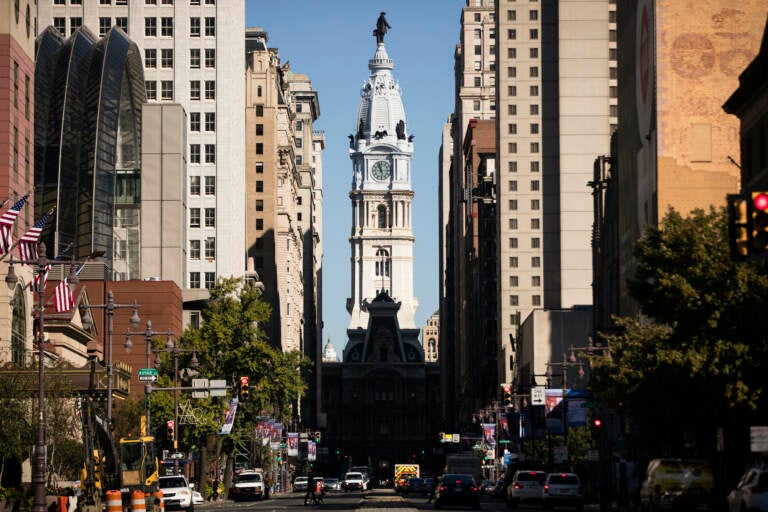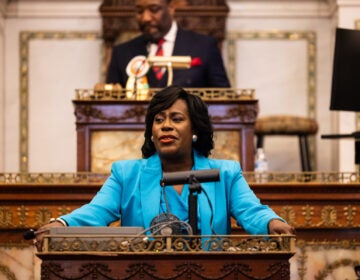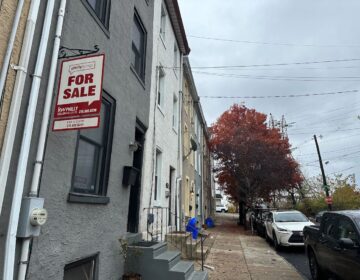‘We’re kind of rushing this’: Philadelphia City Council spars with Parker officials over mayor’s $2B housing plan
The mayor wants Council to adopt her Housing Opportunities Made Easy initiative in tandem with the city’s next budget. Lawmakers will put their $.02 in before that happens.

City Hall in Philadelphia is seen, Wednesday, Oct. 18, 2017. (AP Photo/Matt Rourke)
Have a question about Philly’s neighborhoods or the systems that shape them? PlanPhilly reporters want to hear from you! Ask us a question or send us a story idea you think we should cover.
Lawmakers on Wednesday took aim at Mayor Cherelle Parker’s ambitious housing proposal, asking pointed questions about the plan’s timing, how its programs are funded and the private sector’s role in rounding out what would be an unprecedented public investment.
The $2 billion proposal, called the Housing Opportunities Made Easy initiative, or H.O.M.E., is the mayor’s response to Philadelphia’s ongoing housing crisis. Formally launched in February, it calls on the city to borrow $800 million in bonds to fund dozens of programs largely aimed at achieving a singular goal: creating and preserving 30,000 units of housing.
The mayor wants City Council to pass the plan in tandem with the city’s next budget, which must be approved by July 1, the start of the next fiscal year. But unlike the budget, there is no requirement for lawmakers to pass the mayor’s housing proposal by then.
During Wednesday’s budget hearing, the second dedicated to H.O.M.E., Councilmember Nicolas O’Rourke questioned the administration’s timeline, saying such a comprehensive proposal would likely benefit from more time under the microscope.
“Why is there such a quick timeline on this? Wouldn’t it make more sense for us to have a robust engagement process to help decide the best focus for this funding, and then agree on a more informed and focused plan later in the fall or in the winter?” said O’Rourke, one of the council’s fiercest housing advocates.
“It really feels like we’re kind of rushing this,” he added.
Administration officials pushed back strongly, insisting there is no time to spare given the great need for housing in Philadelphia, which remains the poorest big city in the country.
“We have a crisis and we want to address it now,” said Tiffany Thurman, Parker’s chief of staff. “We don’t want to be paralyzed by inaction.”
Thurman’s response echoed her prepared remarks, which reiterated that Philadelphia is short an estimated 17,000 housing units. She also told council members a “massive portion of the city’s housing stock is old, getting older and in desperate need of repairs” at a time when incomes are not keeping pace and thousands are cost-burdened.
Nearly 500,000 units were built before 1960 and almost 300,000 before 1940, Thurman said.
Funding H.O.M.E.
Against that backdrop, Councilmember Jaime Gauthier raised concerns about the investment the administration has proposed for the Basic Systems Repair Program, or BSRP, a wildly popular initiative that provides free home repairs to low-income homeowners who meet its income guidelines. Participants can correct electrical, plumbing and heating issues, as well as roofing and some structural damage.
Under the mayor’s initiative, BSRP would receive $39.4 million during the next fiscal year, according to budget documents transmitted to Council. Gauthier, who chairs the body’s housing committee and generally supports Parker’s vision, argued that figure would be inadequate for a program the mayor wants to expand by raising its income threshold.
If approved, a household could earn up to 100% of the area median income, a data point that includes places outside of Philadelphia. That translates to $119,400 for a family of four.
At the moment, participants can earn up to 60% ofthe area median income. That translates to $71,640 for a family of four.
During the fiscal year that ends July 1, the program received $32.4 million.
“If we go out and now say 100%, based on the people that are in the city, we’re talking about literally doubling the program at the same the allocation that has been proposed by you all doesn’t account for that,” Gauthier said, adding that thousands of residents have expressed interest in the program in its current form.
In defending the administration’s proposal, Thurman chastised Gauthier for putting a “false narrative out there,” calling the council member’s assertion “irresponsible.”
She also stressed that the mayor’s housing proposal is about helping residents living on a range of incomes.
“We’re thinking about all Philadephians across the spectrum,” Thurman said. “We’re thinking about teachers, police, firefighters that would not have access but for the provisions in this program.”
Jessie Lawrence, director of the city’s Department of Planning and Development, added that income is not the only metric used to approve applications. The level of need for these repairs, he said, also plays a role in who is approved, among other considerations.
The Basic Systems Repair Program is one of 38 that is poised to receive funding under the administration’s H.O.M.E. initiative, which will also trade on the value of existing city assets to help achieve the mayor’s goal of creating or preserving 30,000 units of housing during her first term.
The administration has said those assets are worth $1 billion. To reach $2 billion, the mayor hopes to combine the bonds with about $200 million in additional public dollars, a goal that could be compromised by President Donald Trump’s push to slash federal spending through his administration’s Department of Government Efficiency, also known as D.O.G.E.
While lawmakers have previously raised concerns about those potential cuts, it was not a major theme of Wednesday’s hearing, though Councilmember Nina Ahmad did ask the administration whether it had secured any new funding for the initiative from philanthropic foundations.
To date, it has not.
“Their committing will make us move faster,” Ahmad said.
If City Council adopts the mayor’s housing proposal, the city would borrow about $400 million at a time, with the second chunk expected to come about two years after the first.
Finance Director Rob Dubow told lawmakers Wednesday the $800 million bond would ultimately cost taxpayers about $1.3 billion when interest is taken into account. While the rates will vary, he said there would be an average of $25 million a year in interest payments over 20 years.
The strategy for repaying the loan has yet to be detailed. Parker wants to increase the realty transfer tax, a move she has said would generate $173 million in revenue over the next five years. Dubow said Wednesday the city’s debt service is also projected to decrease moving forward, meaning the initiative’s funding can “fit within our revenue streams.”
“You issue bonds when you think something is a long-term investment and when you see the long-term payoff,” Dubow said. “There’s really nothing that’s more of a long-term investment than housing.”

Subscribe to PlanPhilly
WHYY is your source for fact-based, in-depth journalism and information. As a nonprofit organization, we rely on financial support from readers like you. Please give today.









